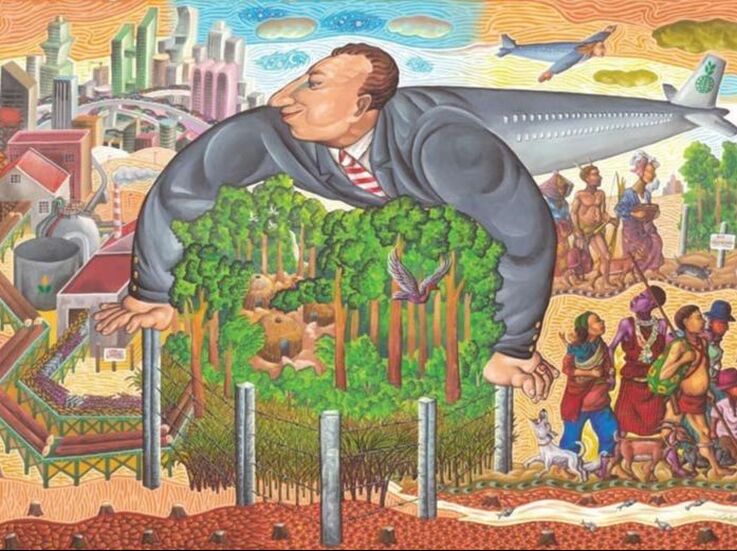|
|
Understanding racial capitalism in Africa: a study of the Nigerian oil-dependent capitalist economy21/10/2020
My Identities article, ‘The capital, state and the production of differentiated social value in Nigeria’, problematises the Nigerian oil-dependent capitalist economy through the perspective of the Black radical tradition. Using Cedric Robinson’s concept of race, I analyse the racialism inherent in the Nigerian capitalist economic relations and the accompanying contradictions. Capitalism is a very powerful historical force that has influenced and still influences diverse social, political and economic landscapes. The state is an agency through which the association of individuals are entrusted with the administration of the affairs of a given society. Both the capital and state are essential agencies in the entrepreneurial model of the capitalist mode of production.
Marxist scholars present capitalism as an unfair system that engages in unequal distribution of the social wealth generated by the society. Marx argues that the capitalist society is divided along class line and the economic factor remains the most decisive determining factor in shaping capitalist dynamics and its contradictions, while culture and other human pre-occupations play a role but not the decisive one. The working class, Marx maintains, is the revolutionary class that will eventually transform the capitalist economy.
The Black radical scholars see capitalism as a racial enterprise and argue that Marx did not identify race as an analytical category. Scholars like W. E. B. Du Bois, C. L. R. James and Richard Wright hold to this contention. In 1983, Cedric Robinson agrees with these scholars but argues that the preceding Black radical scholars understood race from the Eurocentric conceptualisation. Arguably, European scholarly explanations about race resonate only with the 19th and 20th century racialism, where skin colour differences have come to replace the earlier racial ranking order in European societies. Even before the 15th century Europeans’ encounter with ‘people of colour’ (Africa, Asians, Native Americans and the Caribbean), race had been part of European civilisational experience. The ideas of ‘blood difference’, popular myths and legends were used to entrench crippling divisions in the European societies, especially the notion that Western European monarchs and their aristocratic lineages emerged from the ancient bloodline of the Trojan heroes. These, to Robinson represents the actual roots of racialism.
The third world were simply integrated into this racial ranking order in the 19th and 20th centuries. In the process of this integration, Africans were enslaved, and later framed collectively as a homogenous Black group. Racialism is not just that, but also, the waving of a delicate network of social and economic divisions along differences into the entire gamut of the capitalist system itself. On the other hand, Robinson argues that Marx failed to understand that culture and human habits are the real essence of humanity, and therefore, it plays the same role as the economic factor. The capitalist society evolved with substantial racial habits from the preceding feudal society. The proletariat power had been exposed to tremendous limitations with regard to its historical role as a revolutionary agent, because the capitalists have employed race as an instrument to divide the working class. This division as reflected in the historical character of the English working-class with their Irish working colleagues has implications for workers' solidarity. This logic of division was transported through colonialism to societies outside European civilisation. The colonies were established using these differences as social, economic and political categories. These differences became a significant tool in preventing the colonised people from forging any form of consensus that may threaten either the colonial entity or the post-colonial structures. In Nigeria, a former British colonial enclave, this division is visibly seen in the post-colonial, oil-driven economy. The host communities to the oil fields are exposed to this capitalist wrath: a complex web of crippling divisions, dispossession of their land and exposure to deleterious pollution. Capitalism by its nature generates contradictions. In the Niger Delta, it gave rise to community-based social movements. The oil producing communities are subjected to these crippling divisions in two ways: (1) within the entire Nigerian political economy, they are homogenously constructed as minority nationalities; and (2) in the Nigeria Delta region, they are re-constructed into ethnic and dialectical differences. The net effect of this double racialisation is the increase in aggregate returns for capital, both local and global in Nigeria.
Blog post by Buhari Shehu Miapyen, Eastern Mediterranean University, Cyprus
Read the full article: Shehu Miapyen, Buhari. The capital, state and the production of differentiated social value in Nigeria. Identities: Global Studies in Culture and Power. DOI: 10.1080/1070289X.2020.1785182
0 Comments
Your comment will be posted after it is approved.
Leave a Reply. |
|
Explore Identities at tandfonline.com/GIDE |
|
The views and opinions expressed on The Identities Blog are solely those of the original blog post authors, and not of the journal, Taylor & Francis Group or the University of Glasgow.

